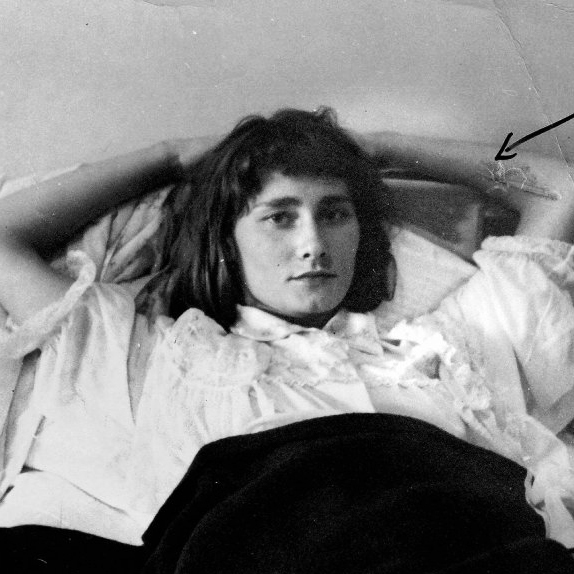The Visit
I come to this place every day
where ghosts flock thickest
— trepidatious dancer
pressing her beating heart —
along the way
I meet cut flowers
they are so beautiful
that I pause and look
the fountain dried up
you need perception
to notice this
among many minor deaths
while the trees have proliferated wonderfully
they sing at four in the morning – I know
the narrow thread of dawn
has turned white during my twenty-eight years
the last four I’ve spent on philosophy
I wanted to solve the mystery of being
but this is what I was shown:
not a body or a tree but
words on words on words
people are mortal
Socrates is human
so Socrates must die
his sentence was delivered
Socrates is dead
store-bought flowers flop
in a golden vase
I visit this place every day
I do not expect a pardon
Dissonance
small world
two stories
on the second, you
wheezing
beside dark
eternity
I belabor
the stairs
sagging shirt
wipe my lips
then mask
them with warm
moist hands
eternity follows
me, we women
stand before
your door
heads touching
speechless
a scream ripped
from a string
hungrily we devour
breath… one… two… three
counting
two stories
only two
quaint, cozy
the same
floating
revolving stars
why is it so hard
to die
* * * (there was a vacancy in the dresser)
there was a vacancy
in the dresser
so we let the spiders move in
they spun until spent
and done
settled
we flipped the stove on its head
they fell out, dignified
we shook the lamps
till it got dark
finally we had a flat
— ours at last! —
cut with the cruel smell
of flowers at twilight
* * * (under my left armpit)
under my left armpit
a nest thaws
the heart bird lives
the heart bird beats
with strained
unmusical wings
torn feathers are
the wind’s residents
the king buries his face
in my warm, ambrosial nest
under my left armpit
the king fears death
a girl stands outside
harvesting orphaned feathers
with a cold hand
lays the wind to rest
* * * (who can fit philosophy between love and death)
who can
fit philosophy
between love and death
I gather living words
from foxing pages
and listen
no one can fit
between love and death
and only sometimes
standing before the sun
behind squinting eyes, a glint
a moment breaks
into rainbow
standing face to face
with the sun
my eyes go blind
the plot unravels…
love and death
prologue and afterword
From the Prophecy
the apostles in the clouds
got absolutely plastered
the world
started to wobble
from side to side
those perfect apostles
flawless and infallible
the people
walking the streets
with hands outstretched
held on to the bricks
business
blossoming
on every corner
Peter half-supported
this partying
with hands
falling like golden leaves
and raised a glass
yelling hallelujah
with all his voice
his juice was spiked
the people
spread their toes
and propped up the sky
Translator’s Note:
Our discovery of Halina Poświatowska carried with it that stroke of serendipity that made translating her poetry seem like a personal mission.
In summer 2018, we picked up a copy of her Wiersze Wybrane (“Selected Poems”) on a whim at a flea market in Kraków, near where Karolina was born, intrigued by her rather spare verse, curious to try translating her. We didn’t spend much time with the book until a few months later, during our time at the Bridge Guard artist residency in Štúrovo, Slovakia, when we began to read about her life in earnest. We were surprised to discover she attended Smith College in Northampton, MA, where Ryan lived for a number of years.
We took the 8-hour train ride to Poświatowska’s hometown, the city Częstochowa, in October. We spent a few days there, visiting her childhood home, which has been converted into a museum devoted to her life, run by her brother Zbigniew. Among the many editions of her poetry in translation—in Italian, Persian, Bulgarian, French—artifacts of her life stood on display: printouts of angular EKGs, typewritten college essays, letters to friends and family, and a map of Smith College, on which she had drawn a square around her dorm.
As aspiring translators, devotees of Polish culture, and, like Poświatowska, a native of Poland (Karolina) and a former inhabitant of Northampton (Ryan), we felt as if a job had fallen into our hands. But as we started to translate her work, we ran into the pitfalls inevitable in the act of carrying poetry into another language. Our trip to Częstochowa confirmed our hopes that translating Poświatowska would be a compelling project. It did not prepare us for the difficulty of the task.
Poświatowska’s poetry is succinct. Many of her poems contain lines that are only one or two words long. Her grammar and vocabulary are uncomplicated. She barely uses punctuation, and her imagination is grounded in simple, physical detail, even when writing on philosophical themes – it’s as if her lines are naked. All of this makes word choice particularly challenging in English. As collaborators who are both poets, one of whom is a native Polish speaker, we turned over every word, thinking through all options, stretching or changing words and phrases when we found it necessary.
At the end of our stay at Bridge Guard, we held a reading of Poświatowska’s poetry in four languages—Polish, English, Slovak, and Hungarian. Two local high school students who helped us produce those translations read with us that night. Translation, we think, is a process that never truly ends. There are always better words to find, better ways of organizing a line, other languages to try. That night, we celebrated the imperfection of translation, as we all listened in our own languages to this tragic, lyric, and delightfully cheeky poet who lived a day’s train ride away from where we stood. The feeling of serendipity hasn’t worn off since.

Ryan Mihaly and Karolina Zapal’s collaborative work dwells in the crossroads between Polish, English, text, image, and music. Their collaborations have been published in Tupelo Quarterly, The Adirondack Review, 3:AM Magazine, and Anomaly. From 2018-2019, they attended three artist residencies: Greywood Arts in Killeagh, Ireland; Brashnar Creative Project in Skopje, Macedonia; and Bridge Guard in Štúrovo, Slovakia, where they began translating Polish writers Halina Poświatowska and Olga Hund into English. They are both graduates of the Jack Kerouac School of Disembodied Poetics in Boulder, CO, and live in Greenville, SC.

Halina Poświatowska (1935-1967) is one of Poland’s most beloved poets. She survived the German invasion of her hometown, Częstochowa, in 1945, though it left her with a chronic heart condition, which would claim her life at the age of 32. Knowing her life would be brief, Poświatowska wrote prolifically: her collected work includes 4 books of poetry, a memoir, and several hundred unpublished stories, essays, and plays. She travelled extensively across Europe and America, and earned a degree in philosophy from Smith College in 3 years. New editions of her work—as well as biographies and critical studies—continue to be published in Poland and around the world in translation.

 BACK TO ISSUE
BACK TO ISSUE